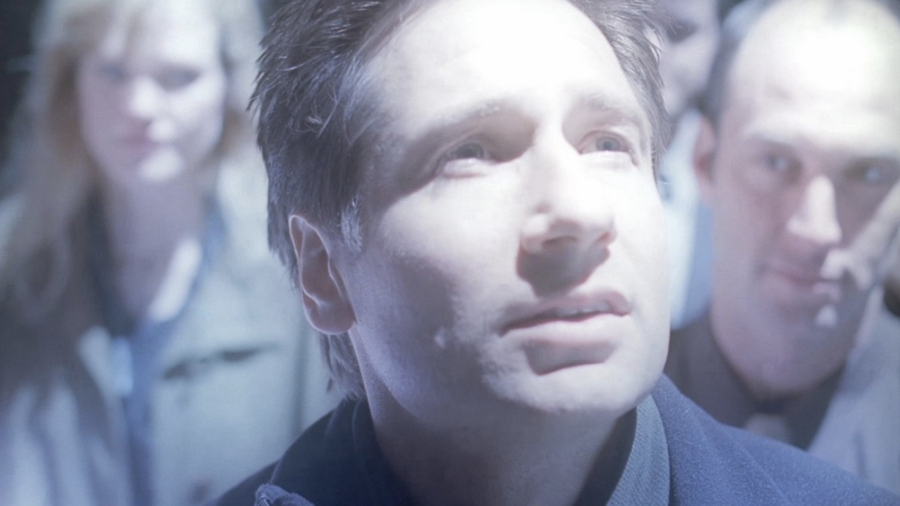The X-Files Theory That Debunks Entire Series Premise

Few series have captivated audiences quite like The X-Files, which became a cornerstone of television in the 90s. Created by Chris Carter, the series followed FBI agents Fox Mulder (David Duchovny) and Dana Scully (Gillian Anderson), who work to uncover the truth behind paranormal phenomena and government conspiracies known as the X-Files. But one X-Files theory asks what if Mulder’s relentless pursuit of the truth was not driven by actual events but rather a complex, psychological coping mechanism in response to the disappearance of his sister?
Mulder’s Sister

Samantha Mulder is first mentioned in the pilot episode of The X-Files, where Mulder briefly tells Scully that his sister was taken from their home in Chilmark, Massachusetts, when she was eight years old. Mulder was 12 at the time.
He believes she was abducted by aliens, which drives him to uncover the truth behind paranormal phenomena. Throughout the series, he finds various clues and witnesses to support his theory that Samantha’s abduction was part of a larger extraterrestrial conspiracy.
It’s All In Mulder’s Head

However, it’s plausible that this belief, and the existence of the X-Files, is a manifestation of Mulder’s desperate need to make sense of his loss. Psychologically, it is not uncommon for people who experience profound trauma to create intricate narratives as a way to process and cope with their pain.
Mulder’s immersion in the world of the paranormal can be seen as an elaborate defense mechanism to externalize his grief and provide himself with a mission that offers purpose and distraction from his unresolved emotions.
Mulder Doesn’t Have To Confront Anything

The X-Files also allows Mulder to avoid confronting the possibility that Samantha’s fate might be tragically mundane with no deeper significance. As such, the existence of the X-Files division within the FBI could be a product of Mulder’s convincing delusions, supported by his charismatic ability to persuade others to see things from his perspective.
His intense passion and unyielding belief in the paranormal could influence those around him to buy into his narrative, thus creating a feedback loop that reinforces his convictions.
Scully

Dana Scully’s involvement adds another layer to this theory. As a medical doctor and skeptic, Scully often serves as a counterbalance to Mulder’s wild theories. Her rational explanations and scientific approach provide a grounding influence.
However, if we entertain the idea that the X-Files are a construct of Mulder’s mind, Scully’s role takes on a different meaning. She could represent Mulder’s internal struggle between his desire to believe in a larger narrative and the rational part of his psyche trying to pull him back to reality.
The Disappearance

Alternatively, Scully’s qualifications as a medical doctor suggest she could have been Mulder’s physician, tasked with monitoring his mental health. The mystery of Samantha Mulder’s disappearance is explored in multiple episodes throughout The X-Files, but it is primarily resolved in Season 7, Episodes 10 and 11, “Sein und Zeit” and “Closure.”
In “Sein und Zeit,” Mulder discovers a link between his sister’s disappearance and other missing child cases, leading him to the belief that Samantha’s abduction was part of a broader pattern of abductions.
Closure

In “Closure,” it is revealed that Samantha was abducted by government agents involved in the conspiracy. She was experimented on and eventually died in captivity. There are moments in The X-Files where Mulder’s conviction wavers. These instances can be interpreted as cracks in his psychological armor, moments when reality threatens to break through the intricate facade he has built.
Additionally, his emotional turmoil and his encounters with figures from his past could symbolize his ongoing struggle to reconcile his fabricated reality with the painful truth he seeks to escape.
The Truth Is In There

If we accept the premise that the X-Files is a manifestation of Mulder’s coping mechanism, the series takes on a new dimension. Mulder’s journey was never a quest for external truths but an inward odyssey toward self-understanding and acceptance.
The various monsters and conspiracies he encounters represent the multifaceted nature of his trauma and the different ways his mind attempts to process it. Ultimately, the truth that Mulder seeks is not out there but within himself.












